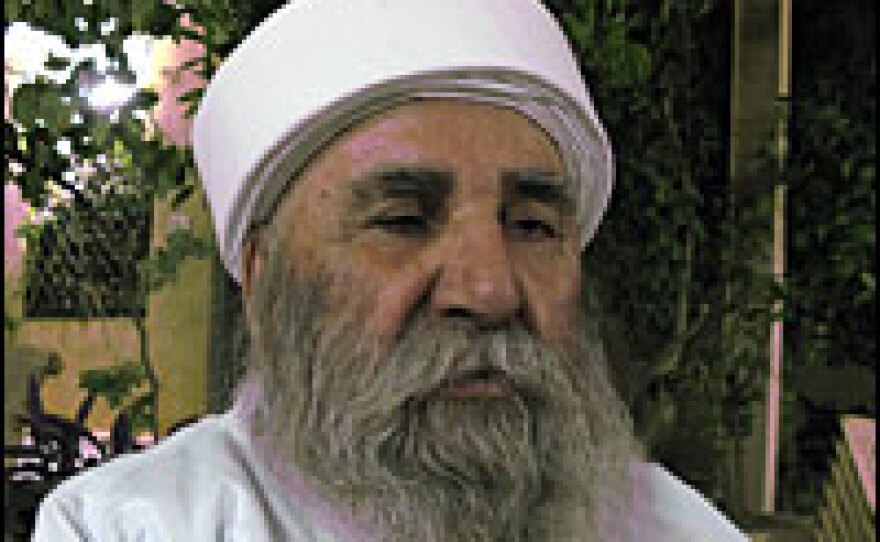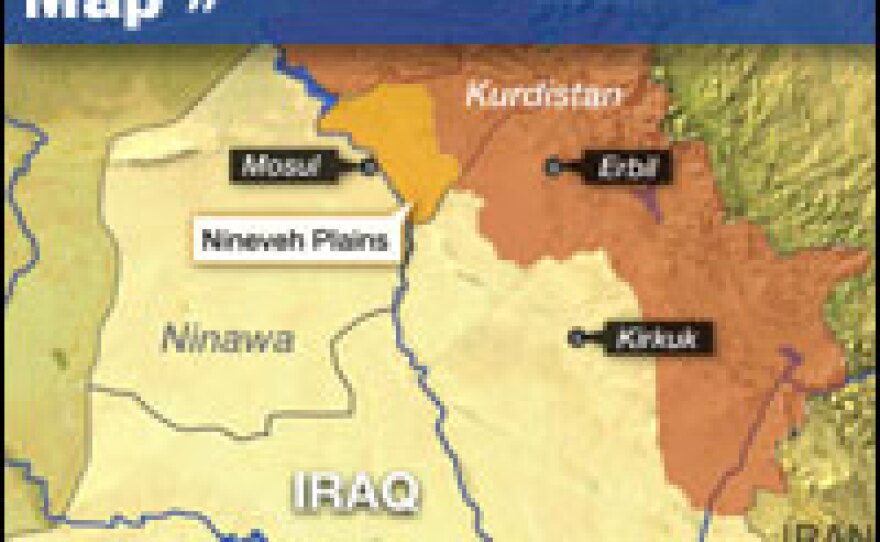

In northern Iraq, thousands of Christian families remain displaced from their homes in the city of Mosul.
Many are living with relatives or taking refuge in churches and monasteries in an area north of the city that's known as the Nineveh Plain.
As they struggle to adapt to their new circumstances, many are questioning why they were targeted for violence and threats. Some say they see themselves as pawns in the struggle for control of their ancestral homeland.
Displacing Christians
The religious cleansing in Mosul began with graffiti, some saying "get out or die," on the walls in Christian neighborhoods. Young men drove through the streets with loudspeakers, shouting at people to leave.
Then the killing started.
"My brother came home from work that day," says a 44-year-old Christian man identifying himself only as Abu Sara. "He went to a nearby shop, where suddenly gunmen turned up and asked him for his ID. Then they told his friends to step aside. They shot him dead and left."
Abu Sara and his family are staying with relatives in a Christian settlement north of Mosul. He is a mathematics teacher, and he weighs his words carefully. He says it's difficult to be certain why the attacks are taking place now, but the word among Christians in Mosul is that Kurds may have a hand in it.
Abu Sara says all the attacks on Christians happened on the side of the city that's dominated by Kurdish troops, yet the Kurds did nothing to stop them.
Um Reyan is a Christian woman whose family is now taking refuge in an Assyrian Catholic church.
"We heard the people from another Christian neighborhood describing how these armed men stormed the houses and shouted at people to get out," she says. "They were speaking in a kind of pidgin Arabic, not like a Mosul accent at all, but like Kurds, trying to speak Arabic."
Expanding Kurdish Territory?
These are startling observations coming from people who are, in effect, living on Kurdish generosity. The settlement where Abu Sara and his family are staying was built by the finance minister of the Kurdistan Regional Government — a Christian named Sarkis Aghajan Mamendu.
The church where Um Reyan is staying is also receiving money from Sarkis.
Why would the Kurdistan regional government be involved in attacking Christians in Mosul, yet protecting them once they've been displaced to the Nineveh Plain area?
"The Nineveh Plain is these people's ancestral homeland," says Michael Youash, director of the Iraq Sustainable Democracy Project, based in Washington, D.C. "But in today's Iraq, it is an area being contested by the Kurdistan Regional Government, seeking to absorb that area into an expanded KRG, and these people are caught in the middle of it."
Youash's group advocates for minorities in Iraq — not just Christians, but other sects, such as the Yazidis and Sabeans.
Youash says the Nineveh Province Council, which includes Mosul, is seeking to weaken the Christians by preventing the establishment of a local police force to protect them. The council is dominated by Kurds. Youash is calling for a U.N. investigation and a multinational force to protect the Christians in the plain.
Iraqi government spokesman Ali al-Abeeb says a government investigating committee has come to a similar conclusion: that the Kurds are seeking to use the displaced Christians to expand Kurdish territory.
Kurds Deny Playing Politics
Adnan Mufti, the speaker of the Kurdistan Regional Government's parliament, says the notion that Kurds are playing a cynical game to dominate the area is laughable.
"It's irresponsible talk," he says. "Really, there are some people, if they hear that any crime, any plan is [conceived] outside of Iraq, they are ready to say 'that's the plan of Kurds.' "
Mufti acknowledges that the Kurdistan Regional Government is supporting displaced Christians through its finance minister, but he says that's because the Kurds themselves know what it's like to be the victims of ethnic cleansing under Saddam Hussein's regime, and they're acting from humanitarian motives.
Mufti also points out that the protection of Christians in Mosul is the responsibility of Iraq's central government. He says the Kurdish troops there are under control of the Iraqi army, and if they didn't respond to the threats against Christians, it may be because they were ordered not to intervene.
Ancient Sect On Board With Kurdish government
A foreshadowing of the Christians' role in the Nineveh Plain may be seen in the example of the Yazidis, a sect whose beliefs stem from ancient Zoroastrianism. The Yazidis were the target of the worst sectarian slaughters in Iraq just last year, when nearly 800 were killed in a coordinated suicide bomb attack.
Their spiritual leader, the Baba Sheik, says his people have since been protected by the Kurdistan Regional Government. Robed and turbaned in white, the bearded leader urges the Christians to join with Yazidis in voting to extend the Kurdistan boundaries to include the Nineveh Plain.
"We want the borders of the Kurdistan Region to expand," he says, "to include all the areas where these minorities are living, because the Kurdistan region is secure."
Even in those Christian communities where people suspect Kurds may be behind their displacement, some people say they will support the Kurds' aims to gain security.
"Let me tell you that we are now taking their side, because they helped us and opened their doors to us," says a refugee Christian woman. "When I am desperate for help and someone reaches out to aid me, he will gain me to his side."
This same woman, a displaced Christian living with 28 other people in a church conference room, says she believes the crisis will be over as soon as Iraq holds its provincial elections, early next year.
Copyright 2022 NPR. To see more, visit https://www.npr.org. 9(MDAzMjM2NDYzMDEyMzc1Njk5NjAxNzY3OQ001))






